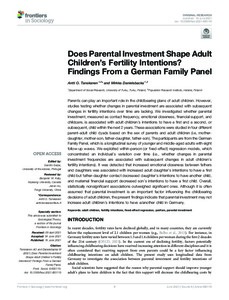Does Parental Investment Shape Adult Children's Fertility Intentions? Findings From a German Family Panel
Tanskanen Antti O; Danielsbacka Mirkka
Does Parental Investment Shape Adult Children's Fertility Intentions? Findings From a German Family Panel
Tanskanen Antti O
Danielsbacka Mirkka
FRONTIERS MEDIA SA
Julkaisun pysyvä osoite on:
https://urn.fi/URN:NBN:fi-fe2021093048960
https://urn.fi/URN:NBN:fi-fe2021093048960
Tiivistelmä
Parents can play an important role in the childbearing plans of adult children. However, studies testing whether changes in parental investment are associated with subsequent changes in fertility intentions over time are lacking. We investigated whether parental investment, measured as contact frequency, emotional closeness, financial support, and childcare, is associated with adult children's intentions to have a first and a second, or subsequent, child within the next 2 years. These associations were studied in four different parent-adult child dyads based on the sex of parents and adult children (i.e, mother-daughter, mother-son, father-daughter, father-son). The participants are from the German Family Panel, which is a longitudinal survey of younger and middle-aged adults with eight follow-up waves. We exploited within-person (or fixed-effect) regression models, which concentrated an individual's variation over time (i.e., whether changes in parental investment frequencies are associated with subsequent changes in adult children's fertility intentions). It was detected that increased emotional closeness between fathers and daughters was associated with increased adult daughter's intentions to have a first child but father-daughter contact decreased daughter's intentions to have another child, and maternal financial support decreased son's intentions to have a first child. Overall, statistically nonsignificant associations outweighed significant ones. Although it is often assumed that parental investment is an important factor influencing the childbearing decisions of adult children, the present findings indicate that parental investment may not increase adult children's intentions to have a/another child in Germany.
Kokoelmat
- Rinnakkaistallenteet [27094]
